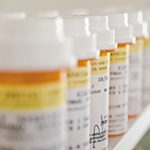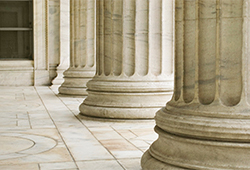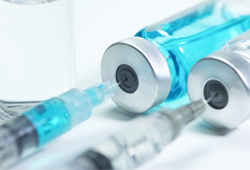Five Key Regulatory Considerations for Virtual Ketamine Clinics
 The off-label use of ketamine to treat anxiety, depression, and other behavioral health disorders —coupled with the COVID-19 telehealth era—has spurred the opening of virtual ketamine clinics nationwide. Some clinics offer a full suite of health care services, including telehealth visits, prescribing, pharmacy dispensing, and counseling services, while others are focused on more niche areas like group coaching sessions. In the wake of public reports detailing investigations into a number of digital health companies prescribing controlled substances, it is more important than ever to ensure your business model complies with the various regimes regulating the use of ketamine to treat behavioral health issues.
The off-label use of ketamine to treat anxiety, depression, and other behavioral health disorders —coupled with the COVID-19 telehealth era—has spurred the opening of virtual ketamine clinics nationwide. Some clinics offer a full suite of health care services, including telehealth visits, prescribing, pharmacy dispensing, and counseling services, while others are focused on more niche areas like group coaching sessions. In the wake of public reports detailing investigations into a number of digital health companies prescribing controlled substances, it is more important than ever to ensure your business model complies with the various regimes regulating the use of ketamine to treat behavioral health issues.
Read the client alert here.
 On August 16, President Biden signed the Inflation Reduction Act of 2022 into law,[
On August 16, President Biden signed the Inflation Reduction Act of 2022 into law,[ The COVID-19 Public Health Emergency (“PHE”) fundamentally changed the healthcare industry, forcing healthcare providers and patients onto their computers and phones to enable continuation of care when patients were mandated to stay home across the country. Prior to the COVID-19 PHE, approximately 12,5000 Medicare beneficiaries received telehealth services and only 106 telehealth services were reimbursable. By October 2020, over 24.5 million (of 63 million) Medicare beneficiaries received telehealth services.
The COVID-19 Public Health Emergency (“PHE”) fundamentally changed the healthcare industry, forcing healthcare providers and patients onto their computers and phones to enable continuation of care when patients were mandated to stay home across the country. Prior to the COVID-19 PHE, approximately 12,5000 Medicare beneficiaries received telehealth services and only 106 telehealth services were reimbursable. By October 2020, over 24.5 million (of 63 million) Medicare beneficiaries received telehealth services.


 As part of the U.S. government’s response to the COVID-19 pandemic, on March 10, 2020, the Secretary of Health and Human Services (“Secretary”) issued a Declaration pursuant to the Public Readiness and Emergency Preparedness Act (“PREP Act”), 42 U.S.C. § 247d-6d. This Declaration activated immunity from personal injury, property damage, and other types of claims for companies and certain professionals who manufacture, distribute, or use “covered countermeasures”— certain drugs and devices, or components thereof, that may be used to treat COVID-19 patients or combat the COVID-19 pandemic.[1] The PREP Act provides broad immunity from liability, but applies only to products and persons that qualify for the immunity under the PREP Act and the limits established in the Secretary’s Declaration.
As part of the U.S. government’s response to the COVID-19 pandemic, on March 10, 2020, the Secretary of Health and Human Services (“Secretary”) issued a Declaration pursuant to the Public Readiness and Emergency Preparedness Act (“PREP Act”), 42 U.S.C. § 247d-6d. This Declaration activated immunity from personal injury, property damage, and other types of claims for companies and certain professionals who manufacture, distribute, or use “covered countermeasures”— certain drugs and devices, or components thereof, that may be used to treat COVID-19 patients or combat the COVID-19 pandemic.[1] The PREP Act provides broad immunity from liability, but applies only to products and persons that qualify for the immunity under the PREP Act and the limits established in the Secretary’s Declaration. As discussed in Goodwin’s prior Client Alert, on April 10, 2020, the U.S. Department of Health and Human Services (HHS) began disbursing $30 billion to Medicare providers and suppliers under the Public Health and Social Services Emergency Fund (PHSS Emergency Fund). HHS is requiring providers to agree to certain terms and conditions or return the payments. A number of the terms and conditions created some confusion as to whether providers who have not provided services directly related to COVID-19 may keep the payments. HHS has now clarified that providers may keep payments distributed under the PHSS Emergency Fund regardless of whether they have or will provide services directly related to COVID-19.
As discussed in Goodwin’s prior Client Alert, on April 10, 2020, the U.S. Department of Health and Human Services (HHS) began disbursing $30 billion to Medicare providers and suppliers under the Public Health and Social Services Emergency Fund (PHSS Emergency Fund). HHS is requiring providers to agree to certain terms and conditions or return the payments. A number of the terms and conditions created some confusion as to whether providers who have not provided services directly related to COVID-19 may keep the payments. HHS has now clarified that providers may keep payments distributed under the PHSS Emergency Fund regardless of whether they have or will provide services directly related to COVID-19. On Friday, April 10, 2020, the U.S. Department of Health and Human Services (HHS) announced it will begin disbursing $30 billion of the $100 billion of the Public Health and Social Services Emergency Fund recently allocated by the Coronavirus Aid, Relief, and Economics Security Act (CARES Act), signed March 27, 2020. Inclusive of the $30 billion, the $100 billion funding will be used to reimburse healthcare providers and facilities.
On Friday, April 10, 2020, the U.S. Department of Health and Human Services (HHS) announced it will begin disbursing $30 billion of the $100 billion of the Public Health and Social Services Emergency Fund recently allocated by the Coronavirus Aid, Relief, and Economics Security Act (CARES Act), signed March 27, 2020. Inclusive of the $30 billion, the $100 billion funding will be used to reimburse healthcare providers and facilities.